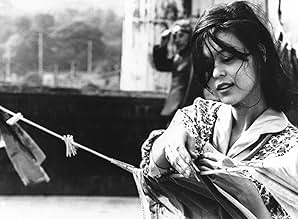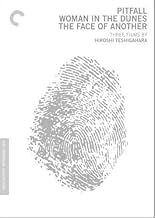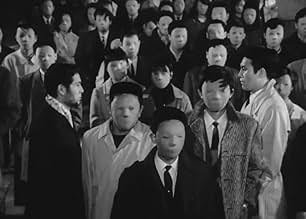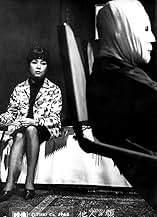IMDb-BEWERTUNG
7,9/10
10.925
IHRE BEWERTUNG
Füge eine Handlung in deiner Sprache hinzuA businessman with a disfigured face obtains a lifelike mask from his doctor, but the mask starts altering his personality.A businessman with a disfigured face obtains a lifelike mask from his doctor, but the mask starts altering his personality.A businessman with a disfigured face obtains a lifelike mask from his doctor, but the mask starts altering his personality.
- Auszeichnungen
- 2 wins total
Robert Dunham
- Foreign man in Bar
- (Nicht genannt)
Handlung
WUSSTEST DU SCHON:
- WissenswertesDirector Hiroshi Teshigahara said that he intended the film to explore both personal and cultural identities. While the examination of personal identity is quite overt, Teshigahara also explored how Japan's cultural identity had been impacted by World War II and its aftermath.
- Zitate
Psychiatrist: You're not the only lonely man. Being free always involves being lonely. Just there is a mask you can peel off and another you can not.
- VerbindungenReferenced in Funeral Parade of Roses (1969)
Ausgewählte Rezension
A brutal commentary on self-image and the way that appearances can change the attitude and ideals of a person that is one of the best films I've ever seen. The way that Okuyama changes throughout the film is incredible. He starts off as a brutally wounded man, who is afraid to go out in public due to his horrible disfigurement. He realizes how important looks are and all he wants is a new face so that he can blend back into society and be with his wife again. There's no desire to be attractive or important, he just wants to be normal. But once he gets his new face, his attractive appearance turns him into a completely different man. He buys flashy clothes and walks around with an attitude of superiority and importance in a world where he is really just a stranger. The film does a remarkable job of showing just how important appearance truly is, even if you think you can look beyond it. This is shown through Okuyama's wife, who pretends like she loves him even though he is horribly disfigured, but she ends up refusing his sexual advances due to it. Teshigahara uses bleak tones and minimalist sets as a way to show the isolation that society creates do to it's one-dimensional view of forming opinions on people merely due to appearance. These settings also do a great job of focusing the viewer on the characters instead of flashy visuals and elaborate sets.
I thought that the Psychiatrist was also a very complex character as he becomes more and more interested in his experiment with Okuyama's new face and less interested in Okuyama himself. He becomes greedy and selfish in his desire to mass produce the masks, but Okuyama's greed compels him to reject the Psychiatrist's wishes and look out merely for himself. This greed makes him a very dangerous man who is hanging on the edge of a breakdown through most of the film, until an encounter with his wife finally sets him off. It's the Psychiatrist's greed, though, that ends up being the true horror of the film. Okuyama realizes the dangerous monster that this mask has turned him into, and does the only thing he can think of to stop him from harming the world. It's the Psychiatrist's greed, though, that unleashes the beast of Okuyama into the world which leads to the abrupt and shattering finale. The paradox of a physical monster versus a psychological monster is absolutely sensational. In the beginning he is deformed on the outside, but as he becomes normal and beautiful on the outside, he ends up being a terrible monster internally. There is only one thing that I can really complain about, and that is the entire story of the "Facially scarred young woman". All of her scenes felt really out of place and added nothing to the fantastic commentary and intelligence of the plot. Everything with her was just unnecessary, but this was just a mere chink in the grand masterpiece that the film embodies as a whole.
I thought that the Psychiatrist was also a very complex character as he becomes more and more interested in his experiment with Okuyama's new face and less interested in Okuyama himself. He becomes greedy and selfish in his desire to mass produce the masks, but Okuyama's greed compels him to reject the Psychiatrist's wishes and look out merely for himself. This greed makes him a very dangerous man who is hanging on the edge of a breakdown through most of the film, until an encounter with his wife finally sets him off. It's the Psychiatrist's greed, though, that ends up being the true horror of the film. Okuyama realizes the dangerous monster that this mask has turned him into, and does the only thing he can think of to stop him from harming the world. It's the Psychiatrist's greed, though, that unleashes the beast of Okuyama into the world which leads to the abrupt and shattering finale. The paradox of a physical monster versus a psychological monster is absolutely sensational. In the beginning he is deformed on the outside, but as he becomes normal and beautiful on the outside, he ends up being a terrible monster internally. There is only one thing that I can really complain about, and that is the entire story of the "Facially scarred young woman". All of her scenes felt really out of place and added nothing to the fantastic commentary and intelligence of the plot. Everything with her was just unnecessary, but this was just a mere chink in the grand masterpiece that the film embodies as a whole.
Top-Auswahl
Melde dich zum Bewerten an und greife auf die Watchlist für personalisierte Empfehlungen zu.
- How long is The Face of Another?Powered by Alexa
Details
Box Office
- Weltweiter Bruttoertrag
- 35.185 $
- Laufzeit2 Stunden 2 Minuten
- Farbe
- Sound-Mix
- Seitenverhältnis
- 1.33 : 1
Zu dieser Seite beitragen
Bearbeitung vorschlagen oder fehlenden Inhalt hinzufügen



































